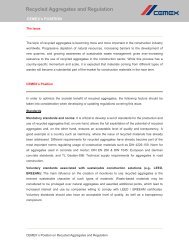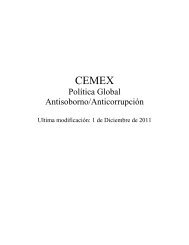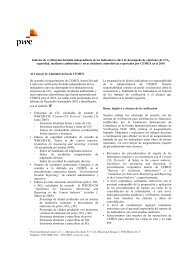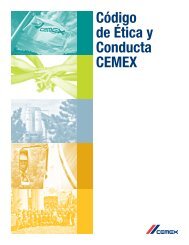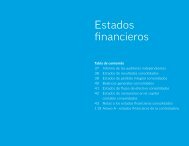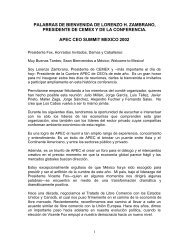building a STRONGER foundation - Cemex
building a STRONGER foundation - Cemex
building a STRONGER foundation - Cemex
You also want an ePaper? Increase the reach of your titles
YUMPU automatically turns print PDFs into web optimized ePapers that Google loves.
The Asia-Pacific region will likely be affected if the economic landscape further deteriorates. An additional increase in country<br />
risk and/or decreased confidence among global investors would also limit capital flows and investments in the Asian region. In the<br />
Middle East region, lower oil revenues and tighter credit conditions could moderate economic growth and adversely affect<br />
construction investments. Our operations in the United Arab Emirates (the “UAE”) have been adversely affected by credit concerns<br />
and the end of the construction boom. In addition, the accumulated housing overhang, the rapid decline in property values, and the<br />
radical change in the international financial situation could prompt a sudden adjustment of the residential markets in some of the<br />
countries in the region. The recent political instability in Egypt, which resulted in former President Hosni Mubarak resigning from his<br />
post on February 11, 2011, is currently causing a reduction in overall economic activity in Egypt, which is affecting demand for<br />
<strong>building</strong> materials, and interruptions in services, such as banking, which is also having a material adverse effect on our operations in<br />
Egypt.<br />
If the economies of the major countries where we operate were to continue to deteriorate and fall into an even deeper and longer<br />
lasting recession, or even a depression, our business, financial condition, and results of operations would be adversely affected.<br />
The Financing Agreement contains several restrictions and covenants. Our failure to comply with such restrictions and<br />
covenants could have a material adverse effect on us.<br />
The Financing Agreement has required us, beginning June 30, 2010, to comply with several financial ratios and tests, including<br />
a consolidated coverage ratio of EBITDA to consolidated interest expense of not less than (i) 1.75:1 for each semi-annual period<br />
beginning on June 30, 2010 through the period ending December 31, 2012 and (ii) 2.00:1 for the remaining semi-annual periods to<br />
December 31, 2013. In addition, the Financing Agreement allows us a maximum consolidated leverage ratio of total debt (including<br />
the perpetual debentures) to EBITDA for each semi-annual period not to exceed 7.75:1 for the period beginning June 30, 2010 and<br />
ending June 30, 2011, decreasing to 7.00:1 for the period ending December 31, 2011, and decreasing gradually thereafter for<br />
subsequent semi-annual periods to 4.25:1 for the period ending December 31, 2013. Our ability to comply with these ratios may be<br />
affected by current economic conditions and high volatility in foreign exchange rates and the financial and capital markets. Pursuant to<br />
the Financing Agreement, we (i) were prohibited from making aggregate capital expenditures in excess of U.S.$700 million for the<br />
year ended December 31, 2010 and (ii) are prohibited from making aggregate capital expenditures in excess of U.S.$800 million for<br />
the year ending December 31, 2011 and each year thereafter until the debt under the Financing Agreement has been repaid in full. For<br />
the years ended December 31, 2009 and 2010, we recorded U.S.$636 million and U.S.$555 million in capital expenditures,<br />
respectively.<br />
We are also subject to a number of negative covenants that, among other things, restrict or limit our ability to: (i) create liens;<br />
(ii) incur additional debt; (iii) change our business or the business of any obligor or material subsidiary (as defined in the Financing<br />
Agreement); (iv) enter into mergers; (v) enter into agreements that restrict our subsidiaries’ ability to pay dividends or repay<br />
intercompany debt; (vi) acquire assets; (vii) enter into or invest in joint venture agreements; (viii) dispose of certain assets; (ix) grant<br />
additional guarantees or indemnities; (x) declare or pay cash dividends or make share redemptions; (xi) issue shares; (xii) enter into<br />
certain derivatives transactions; (xiii) exercise any call option in relation to any perpetual bonds we issue unless the exercise of the call<br />
options does not have a materially negative impact on our cash flow; and (xiv) transfer assets from subsidiaries or more than 10% of<br />
shares in subsidiaries into or out of CEMEX España or its subsidiaries if those assets or subsidiaries are not controlled by CEMEX<br />
España or any of its subsidiaries.<br />
The Financing Agreement also contains a number of affirmative covenants that, among other things, require us to provide<br />
periodic financial information to our lenders. Pursuant to the Financing Agreement, however, a number of those covenants and<br />
restrictions will automatically cease to apply or become less restrictive if (i) we receive an investment-grade rating from two of<br />
Standard & Poor’s, Moody’s Investors Service, Inc. and Fitch Ratings; (ii) we reduce the indebtedness under the Financing Agreement<br />
by at least 50.96% (approximately U.S.$7.6 billion) from the original amount of U.S.$15 billion; (iii) our consolidated leverage ratio<br />
for the two most recently completed semi-annual testing periods is less than or equal to 3.5:1; and (iv) no default under the Financing<br />
Agreement is continuing. Restrictions that will cease to apply when we satisfy such conditions include the capital expenditure<br />
limitations mentioned above, any applicable margin increases that were due to a failure to meet amortization targets, and several<br />
negative covenants, including limitations on our ability to declare or pay cash dividends and distributions to shareholders, limitations<br />
on our ability to repay existing financial indebtedness, certain asset sale restrictions, the quarterly cash balance sweep, certain<br />
mandatory prepayment provisions, and restrictions on exercising call options in relation to any perpetual bonds we issue (provided<br />
that participating creditors will continue to receive the benefit of any restrictive covenants that other creditors receive relating to other<br />
financial indebtedness of ours in excess of U.S.$75 million). At such time, several baskets and caps relating to negative covenants will<br />
also increase, including permitted financial indebtedness, permitted guarantees and limitations on liens. However, there can be no<br />
assurance that we will be able to meet the conditions for these restrictions to cease to apply prior to the final maturity date under the<br />
Financing Agreement.<br />
6



